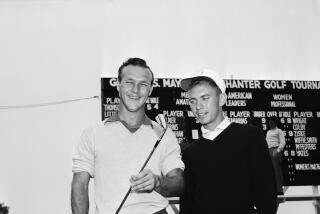Putting Is Easy--Well, for Stockton
What you have to like about Dave Stockton is that he was a heretic. If golf were a church, he’d be excommunicated. If he lived in old Salem, he’d be burned. If a priest, he’d be defrocked.
You see, if you know golf and golfers, you know the one thing they have in common is a positive detestation, a hatred, of putting. To a man, they are convinced it is an invention of the Devil. They will tell you quite seriously that, were it not for putting, they would be winning eight to 10 tournaments a year. Including the Masters.
Pro golfers are all good putters, but to admit it is considered a breach of the code. Unmanly. It’s blasphemy to admit out loud that you can putt. You are tempting retribution of the golf gods. Even over-the-hill golfers will tell you, quite seriously, “Tee-to-green, I’m hitting the ball as well as I ever did--I just can’t buy a putt.” Ben Hogan, no less, once said, “They should call one game golf--and putting something else.” Sam Snead put the word “yips” in the language as an epithet for the paralysis that overtakes the player facing a 10-foot downhill slider to save par.
Dave Stockton would have none of this. He broke the code, violated the unwritten law. It was like a Mafioso squealing.
“I looked on putting as the easiest part of the game,” Stockton says.
Now, if you know the great game, you know that is like burning the flag. Practically Communism. Atheism. Anarchy. Certainly, heresy. That equates him with a terrorist.
Dave Stockton never did conform to your profile of the average American golfer. What you had to admire about him is what he has been able to do on the tour with his skills. I mean, anyone can win with four aces. Stockton managed it with a busted flush. Anyone can win with a knockout wallop in either hand. Stockton did it with jabs. Anyone can beat you with the three-run homer. Stockton, so to speak, beat you with the glove.
When he came on the golf tour, he didn’t hit the booming drives that became the trademark of the era. Nobody oohed and aahed when he came up to the tee, a la John Daly. He was not John Daly. He was more like John Public.
John Daly socks the ball into the horizon. Dave Stockton socked it into the fairway.
When he played Jack Nicklaus, he would have a four-wood for a second shot. Nicklaus would have an eight-iron. But, when they walked onto the green, it was often Stockton who could turn sweetly and murmur, “I believe it’s you, Jack.”
Golfers as a class are funny. It bothers them to be outdriven. It affects their self-esteem. It affects their game. Ninety percent of them start pressing. Length off the tee is a macho thing.
Stockton ignored it. Stockton hit the ball where he wanted it, not where the gallery wanted it. No one said, “Wow!” when it landed, they said, “It’ll play.”
And, play it did. Stockton won 11 tournaments, including two PGAs, during his career. He finished second by a shot in the ’78 U.S. Open. He finished second in the ’74 Masters.
No one ever likened his swing to Sam Snead’s or Gene Littler’s. But the ball went straight. The word most often applied to his game was “gutsy.” Dave Stockton trudging up a fairway always looked like a man about to put the course under arrest. There was never any tension in his face or in his swing. It wasn’t entirely confidence. It was merely the look of a guy who knew what had to be done and was setting about to doing it. Efficiently. Stockton always had his sleeves rolled up.
“I never gave up,” he remembers. “I always knew you were going to hit one or two bad shots a round. So, when it happened, I didn’t let it bother me. I could handle it.”
Of course, a guy who thinks putting is easy already has a big edge on his field. Most players consider hitting drivers, fairway woods, even sand shots to be the easy parts of the game. Putting is torture.
“I always figured I could out-putt anybody,” Stockton says. “You don’t cave in if a guy outdrives you. You win games on the green, not on the fairway, and certainly not in the rough. I was indifferent to the tee shot. I figured if I could reach the green in two, it didn’t matter whether I did it with a five-iron or a wedge. And, once there, I could putt better than the other guy. If we both had 10-foot putts, you’d have to bet on me.”
It was this attitude, this ability to win with a thinking man’s game and small skills, that inspired the game to put Stockton in charge of last year’s Ryder Cup matches, which he did with spectacular results, turning the Europeans back for the first time in six years.
Lots of players have a reputation for a “good short game.” Dave’s short game was from tee to green.
Stockton turned 50 in November. Which means he is bringing his dreaded short game to the PGA Senior Tour. He is like the ballplayer who, when asked if he had lost any speed since his youth, responded, “I never had any to lose.” Stockton can say he is as long off the tee as he ever was. Not very.
He makes his California debut with the seniors in the GTE West Classic at the Ojai Valley Inn and Country Club on March 6-8.
Of course, any man who thinks putting is the easiest part of the game is formidable opposition. Because it’s well-known the easiest part of the game is the slice off the tee, right, fellow hackers? But so far as putting is concerned--well, the fourth putt is usually pretty easy, at that.
More to Read
Go beyond the scoreboard
Get the latest on L.A.'s teams in the daily Sports Report newsletter.
You may occasionally receive promotional content from the Los Angeles Times.










